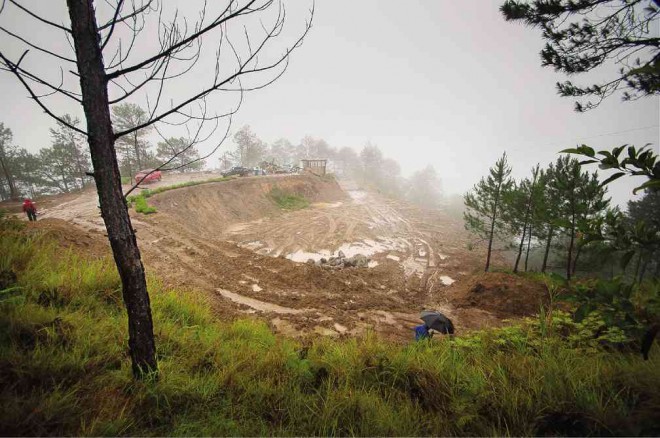Expansion of vegetable gardens alarms DENR

AN ILLEGAL road construction into the Mount Santo Tomas watershed requires massive excavation work that cleared a section of the Cabuyap forest and which may have contaminated four water sources of Baguio Water District, when loosened soil fell into natural springs and a creek. Richard Balonglong/INQUIRER NORTHERN LUZON
LA TRINIDAD, Philippines—The Department of Environment and Natural Resources (DENR) is looking into the impact of gardens planted with salad vegetables that have sprouted over the years around the Mount Santo Tomas watershed in Tuba town.
Last week, the DENR charged a congressman and three contractors with violations of environmental laws for their alleged role in building an illegal road into the portion of the watershed near Mount Cabuyao in Tuba.
Loosened soil dumped from the roadwork had contaminated a creek and three spring sources that serve a section of Baguio City and Tuba.
But the DENR has not yet completed an inventory of gardens near the watershed that also pose a threat to the water sources since these farms may use commercial fertilizers.
“We still need to conduct a survey on the ground to determine how wide the vegetable gardens [have grown within the watershed] but at the moment, the forest is still wider than the gardens,” said Octavio Cuanso, acting Benguet provincial environment and natural resources officer.
Vegetable expansion has become a threat not just to Sto. Tomas but to other forest lands in the province, he said.
Benguet province supplies most of the vegetable needs of Metro Manila. “You cannot just tell farmers to stop because they need to eat and feed their families,” Cuanso said.
The garden expansion has affected Mount Pulag National Park, the Upper Agno watershed reservation, the Lower Agno watershed reservation, the Benguet portions of the Mount Data forest reservation and the central Cordillera mountain range, he said.
At present, he said, Mt. Pulag was in greater danger because recently discovered vegetable intrusions and “kaingin” (slash-and-burn) operations have eaten away 10 hectares of Pulag’s natural forest line.
Cuanso said a government task force had discovered that the expansions were “highly mechanized.”
Three farmers, whose gardens are within the boundary of Bokod and Kabayan towns in Benguet, are facing charges for forest intrusion, he said. Mt. Pulag straddles several towns, but the most severe cases of forest destruction have been taking place near Bokod and Kabayan, he said.
“We need to come up with alternative sources of livelihood so that farmers will not expand their gardens to earn more,” Cuanso said.
He said agencies should look into ways to address the needs of the indigenous communities within the reservations and, at the same time, protect the forest.
He said the Department of Agriculture may have farming technology that would help farmers increase their production without expanding their gardens into the forest. Kimberlie Quitasol, Inquirer Northern Luzon














